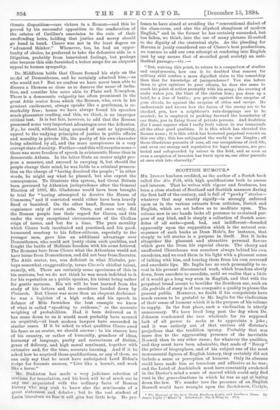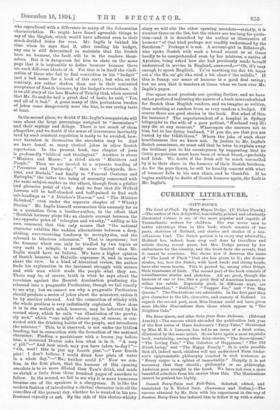SCOTTISH HUMOUR.* Mn INGLIS has been credited, as the author
of a Scotch book called Oor An Polk, with high qualifications both to amuse and interest. That he writes with vigour and freshness, has been a close student of Scotland and Scottish manners during the first half of the century, and is full of " pawky " stories— whatever that may exactly signify—is strongly enforced upon us in the various extracts from criticism, Scotch and English, which are set before us to meditate upon. The volume now in our hands lacks all pretence to sustained pur- pose of any kind, and is simply a collection of Scotch anec- dotes of all sorts—good, bad, and indifferent—founded apparently upon the supposition which is the natural con- sequence of such books as Dean Hole's, for instance, that simply to tell stories is a purpose in itself. But it lacks altogether the pleasant and attractive personal flavour which gave the Dean his especial charm. The cheery and unaffected Churchman was somehow always behind his own anecdotes, and we read them in his light with a pleasant sense of talking with him, and hearing them from his own reverend and anecdotic lips. Mr. Inglis has no such personality to re- veal in his present disconnected work, which broadens slowly down, from anecdote to anecdote, until we realise that a little of it would go a long way even in English, and that with the perpetual broad accent to bewilder the Southern ear, such an °Zia podrida of story is of too composite a quality to please the general publics. Moreover, we doubt if his compatriots have much reason to be grateful to Mr. Inglis for the vindication of their sense of humour which it is the purpose of his volume to supply. In the first place, such a vindication is utterly unnecessary. We have lived long past the day when Dr. Johnson condemned the race wholesale for its supposed lack of all power to make or to appreciate a joke ; and it was entirely out of that curious old dictator's prejudices that the tradition sprang. Probably that was more due to the aggravating presence of the inevitable Boswell than to any other cause; for whatever the qualities, and they must have been admirable, that made of " Bozzy " the prince of biographers, and of his subject one of the most monumental figures of English history, they certainly did not include a sense or perception of humour. Only its absence could have made him so tenacious and adhesive as be was ; and the Laird of Auchinleok must have constantly awakened in the Doctor's mind a sense of marvel which could only find vent in the generalisations in which he was so apt at laying down the law. We wonder how the presence of an English Boswell would have wrought upon the Scotehroan, Carlyle, humour of the Soot Reath Northam Lights and Sontharn Croat. By Janes Inglis ("Maori"), Edluburgh; David Doneas
who reproduced with a difference so many of the Johnsonian characteristics. He might have found agreeable things to say of the English, which woula have adhered even to their much-derided hides for ever. Mr. Inglis is behind his time when he says that if, after reading his budget, any one is still determined to maintain that the Scotch have no humour, the fault will be in the readers them- selves. But it is dangerous for him to state on the same page that it is impossible to define humour because there are such different ideals of it. For that is in itself the vindi- cation of those who fail to find conviction in his " budget " (not a bad name for a book of this sort); but who, on the contrary, are rather shaken than not in their contented acceptance of Scotch humour, by the budget's revelations. It is an old story of the late Master of Trinity that, when assured that Mr. So-and-So had a great deal of taste, he said, "Yes, and all of it bad." A great many of this portentous burden of jokes come dangerously near the line, to our erring taste at least.
In the second place, we doubt if Mr. Inglis's compatriots will care about the large percentage assigned to " meenisters " and their sayings and doings. There is too much of them altogether, and we doubt if the sense of irreverence inevitably bred by such constant repetition is easily to be avoided, how- ever harmless in themselves the anecdotes may be. And we have heard so many clerical jokes in other Scotch repertories. In the present book, one chapter of jests is professedly "biblical and theological." Another is about ," Minister and Manse;" a third about " Ministers and People." Then we are treated to a separate heading of ," Precentor and Psalmody ; " then to " Kirkyards, Sex- tons, and Burials," and finally to "Funeral Customs and Epitaphs," the latter two being of necessity concerned with the same subject-matter as the others, though from a grislier and gloomier point of view. And we fear that Sir Wilfrid ,Lawson will be half-shocked and half-pained to find such sub-headings as "A Drinker's Heaven" and "The Minister Rebuked," even under the separate chapter of "Whisky Stories." Mr. Inglis himself summarises this anomaly for us in a quotation from a brother-author, to the effect that " Scottish humour plays like an electric current between the two opposite poles of releegion and whusky,' " adding as his own comment that this only means that "the national character exhibits the sudden alternations between a deep, abiding, ever-recurring tendency to metaphysics, and the rebound to hilarious relaxation." That is ingenious ; but the humour which can only be kindled by two topics so very unfit to mingle, is surely more limited than Mr. Inglis would have us believe. We have a higher opinion of Scotch humour, as Malvolio expresses it, and in nowise share the view. In a kind of historical review, the author finds his explanation in the incessant struggle with nature and with man which made the people what they are. There may be, of course, truth in what he says about the revulsion against the Romish domination producing the rebound into a pragmatic Puritanism, though we fail exactly to see why; but we cannot see why a pragmatic Puritanism should produce a series of jokes about the ministers, unless it be by another rebound. And the connection of whisky with the whole problem is very indistinctly explained. How close it is in the writer's mind, however, may be inferred by his second story, which he calls "an illustration of the pawky, sly sort," which "one might almost say, of course, is con- nected with the drinking habits of the people, and introduces the minister." This, be it observed, is not under the biblical heading, but in connection with the formation of the national character. Finding a parishioner with a brown jug before him, a reverend Doctor asks him what is in it. "A soop o' yill."—" And how much may you have taken to-day "— " Oh, weel ! this is jest my fourth pint."—" Your fourth pint I don't believe I could drink four pints of water in a whole day."—" Na; neither could I." Now we con- fess, in the first place, that the humour of this opening anecdote is to us more diluted than Tam's drink, and made us shrink a little from three hundred pages of anecdote to follow. In the second, we fail to see why it is more humorous because one of the speakers is a clergyman. It is like the modern fashion of introducing a clerical character into all the comedies of the present day, whether he is wanted in his pro- fessional capacity or not. By the side of this clerico-whisky story we will cite the other opening anecdote—strictly, it is number three on the list, but the others are too long for quota- tion—and it is described by the author as illustrative of humour "of that kind perhaps not readily understood by the Southron." Perhaps it is not. A servant-girl in Edinburgh, who spoke Scotch with such a broad accent as at times hardly to be comprehended even by her mistress, a native of Ayrshire, being asked how she had previously made herself understood in service in England, answered,—" Oh, it's easy enough to speak Englitch. Ye've naething tae dae bit leave oot a' the Rs, an' gie ilka wird a bit chaw i' the middle." if this is funny, our sense of humour is a good deal astray ; but we own that it wanders at times when we turn over Mr. Inglis's pages.
Our space must preclude our quoting further, and we have rather preferred indicating the nature of a book more calculated for Scotch than English readers, and we imagine so written, than selecting at random from so very random a budget. Of course there are good stories in the book. But what of this, for instance P The superintendent of a hospital in Sydney telegraphs to the wife of a poor patient, "Husband very ill; may die at any moment." Whereupon she answers not to him, but to her dying husband, "If you die, see that you are buried by the Oddfellows." Where the joke of such sheer heartlessness lies we know not. In justice to Mr. Inglis's Scotch conscience, we must add that he tries to explain away the brilliant jest to his countrymen by suggesting that its Celtic perpetrator must have been of mixed blood,—probably half Irish. We doubt if the Irish will be much reconciled by it to their share in the humour of their Scotch brethren. As for the poor Saxon, be will be humbly content with what of humour falls to his own share, and be thankful. If he begins suddenly to doubt of Scotch humour again, the fault is Mr. Inglis's.









































 Previous page
Previous page